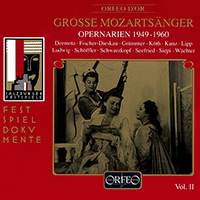Hilde Gueden
Hilde Gueden (Güden in German, originally Hulda Geiringer) came from a family of mixed Austrian, Italian, Hungarian and Jewish ancestry: her father was a banker, her mother an actress. Having begun her musical training with piano lessons at the age of seven, she became a pupil at the Vienna Academy of Music, studying singing with Otto Iro, piano with Maria Wetzelsberger, and dancing. When only sixteen, Gueden caught the attention of the composer Robert Stolz, who offered her a part in his Servus, servus at the Johann Strauss Theatre, Vienna, in 1936. During the run of this operetta she studied acting at the Max Reinhardt Seminar as well as ballet, all with a view to an operatic career. She appeared at the Vienna Volksoper in 1937 (under the name Hulda Gerin) in Benatzky’s Herzen im Schnee, followed by Grüss und Küss aus der Wachau, with Fritz Imhoff.
After the German annexation of Austria in 1938, Gueden’s family prudently moved to Switzerland, where she made her operatic debut as Cherubino / Le nozze di Figaro at the Zürich Opera in 1939, having been immediately contracted following audition. She stayed at Zürich for two years, appearing predominantly in operetta, but left to join the Munich State Opera at the invitation of Clemens Krauss, making her debut there as Zerlina / Don Giovanni. Richard Strauss attended a Munich performance of Così fan tutte and, struck by Gueden’s beauty and fine singing, encouraged her to study Sophie in his Der Rosenkavalier. However as the Nazi persecution of Jews gathered pace she was obliged to escape to Italy in 1942; nonetheless, she took Strauss’s advice and made her Italian debut as Sophie at the Rome Opera in December 1942 under Tullio Serafin, with whom she also sang in Florence. Following the Nazi occupation of Italy Gueden withdrew from performing, seeking shelter first in Venice and then near Milan.
After the war ended Gueden returned to Vienna and immediately began to establish an international career. She first appeared at the Salzburg Festival in 1946 as Zerlina and was to return frequently: her roles there included Cherubino (1947, 1952–1953), Sophie (1949, 1953, 1960), Julia in the first stage performance of Boris Blacher’s Romeo und Julia as well as Lucia in Britten’s The Rape of Lucretia (1950), Norina / Don Pasquale (1952), Zerbinetta / Ariadne auf Naxos (1954), a vivacious Aminta / Die schweigsame Frau (1959) and the Countess / Le nozze di Figaro (1963–1966); in addition she sang in numerous concerts and recitals. Gueden joined the Vienna State Opera in 1947, remaining a key figure in this company until 1973, after which she was made an honorary member. Here her roles included Gilda / Rigoletto, Liù / Turandot, Micaëla / Carmen, Mimì / La Bohème and Rosalinde / Die Fledermaus. Later she moved to heavier parts, including Donna Elvira / Don Giovanni, Fiordiligi / Così fan tutte, Pamina / Die Zauberflöte, Violetta / La traviata, Alice Ford / Falstaff, Mélisande / Pelléas et Mélisande and the title role in Richard Strauss’s Daphne (1964).
At La Scala, Milan and the Royal Opera House, London Gueden first appeared in 1947. She sang at the Edinburgh Festival in 1948 with the Glyndebourne company (Despina / Così fan tutte and Zerlina) and at La Fenice, Venice in 1949 (L’incoronazione di Poppea). Between 1951 and 1960 she appeared regularly with the Metropolitan Opera, New York, enjoying particular success as Rosalinde (1952), Anne Trulove in the American premiere of Stravinsky’s The Rake’s Progress (1953) and Zdenka / Arabella under Rudolf Kempe (1955) opposite Lisa della Casa. Other Met roles included Gilda, Mimì and Musetta / La Bohème, Micaëla, Susanna / Le nozze di Figaro, Sophie, Euridice / Orfeo ed Euridice, Norina, and Marguerite / Faust.
Gueden’s voice possessed a highly individual timbre, a ‘silvery gleam’. Adept at coloratura, she was an extremely accomplished Mozart and Richard Strauss singer, and was unsurpassed in operetta. Above all she possessed a radiant personality, which was always apparent even though towards the end of her career she was handicapped by serious illness. She recorded extensively for Decca throughout the 1950s in numerous complete opera recordings as well as in several recitals. Many recordings of her live performances have also been published.
© Naxos Rights International Ltd. — David Patmore (A–Z of Singers, Naxos 8.558097-100).






















